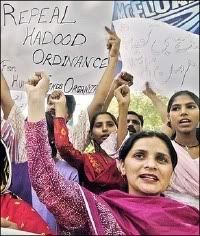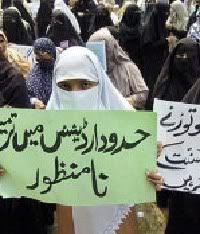 The women’s protection bill of Pakistan — which will dramatically alter the rape laws of Pakistan — has a chance of being passed this coming Monday. The bill is an attempt to reform the draconian rape laws of Pakistan from 1979, passed by then dictator Zia ul Haq under the auspices of the religious establishment (part of the hudood ordinance).
The women’s protection bill of Pakistan — which will dramatically alter the rape laws of Pakistan — has a chance of being passed this coming Monday. The bill is an attempt to reform the draconian rape laws of Pakistan from 1979, passed by then dictator Zia ul Haq under the auspices of the religious establishment (part of the hudood ordinance).


This has been a contentious issue in Pakistan (see my commentary on it here). I have been in correspondence with individuals who are involved in the Women’s Protection Bill. While on one hand they have had to contend with the religious establishment, they have also ran into opposition by some liberal groups, and international NGO’s like Human Rights Watch, who find the proposed amendments inadequate.
What the reformists are trying to explain, however, is that while total repeal of the bill would be wonderful, politics is a process, and that means taking whatever progress that can be gotten right now. While concerns about the fact that the bill is being pushed through by a dictator (Musharraf) are valid, they are unfair in light of the tremendous abuses that will be alleviated if this bill is passed. In the short term, the reformists — and those backing the bill — need our support. Later, more progress can be made.
In an op-ed that appeared in The Daily Times today (10 September, 2006) Feisal Naqvi points out:
…the response from women’s groups to the proposed Women’s Protection Act has either been hostile or at best, tepid. Instead of supporting the bill, women’s groups have only reiterated their demand for the complete repeal of the Hudood Ordinance. What these groups forget is that politics is the art of ‘the possible’. The Women’s Protection Act may not be perfect but it will certainly bring relief to millions of oppressed women. In any event, the fight for repeal can always be carried on later.
The reformists need to be recognized for the good they have achieved despite the enormous difficulties, and not to be criticized for what they have failed to achieve. The full article by Feisal Naqvi in The Daily Times is worth a read because it clearly explains what the issues are and how they are being dealt with in the new law. It concludes:
If all goes according to the government’s plan, much of what is undesirable in the Offence of Zina (Enforcement of Hudood) Ordinance, 1979 (to give the law its full name) will be quietly gutted through the proposed Protection of Women’s Act… The proposed law marks the absolute limit of what is possible in terms of today’s political climate. More importantly, the Protection of Women’s Act is not a whitewash job: instead, it addresses and fixes the major sources of women’s oppression under the Hudood Ordinance.
The best thing to do right now is to support the efforts of the reformists and later carry their torch further. It would be a terrible tragedy if after decades of efforts the amendments were tabled due to inadequate support by progressives. Well intentioned people around the world need to express their support. (For more see: ‘The Right To Own Women’ and Women’s Protection Bill Cheat Sheet). [Also see earlier ATP Poll on related issue].
Ali Eteraz describes himself as “a continental philosopher, essayist, novelist, student of Islamic arts, philosophy, jurisprudence and a practitioner of global nomadism” and blogs under this pseudonym at Eteraz, where you will find much on this and related subjects.




















































[quote post=”297″]No Adnan, I am not going to read those links. [/quote]
That’s how MMA people reacted initially and tore the pages.Same mullahs which are cursed by you people.Is it not funny that you (which I am not surprised anyway) behaving like them that is not going thru sources?
Did you go thru orignal hudood law and ammended law?
The sources which had a statistics about rate of punishments given to men and women which resulted out tht more men were punished due to tat ordininance?yes same men who are despised by our feminist class and blame men for every evil on earth.Dont you think you are synch with those right wing pseudo mullahs .*grin*
[quote post=”297″]why don’t YOU explain it to me in layman’s terms as to what is wrong with the bill[/quote]
*grin*.Well you failed to present that is “right”.Anyway.Just tell me,are you familiar with terms like Qazf,Rijm?Can you please tell me what is covered in hudood of Allah and what is hudood by men?Can you tell me which chapter of Quran specifically covered women[wife] rights?
@PatExpat:nods.Thatswhy I was kept requesting these so called ‘liberals’ to go thru stats and reality but as my respected fellow “dakter” claimed tht it was not concinving is laughable since that link also provided stats of the punishments resulted due to that law and more men were actually punished which was also witnessed by a foriegn researcher mentioned in the article.But as I always say left extreeme wing(liberals,secularists) is not different than right exteme wing(MMA people) and both always reject to accept reality and keep following “Mey Na Manoun”. If one doesn’t even to accept the stats then one should understand that how sincere they are to protect women.
It’s just in ….
[quote post=”297″]Pakistani Government had agreed to a “compromise” by letting rape victims choose between prosecuting suspects under the Islamic four-witness rule, or under Pakistan’s civil penal code.[/quote]
Read More here.
BTW, where do these so called religious leaders who never able to acquire majority in the house via votes gets their power? I just wanna know their secret of successful blackmailing.
Very nice post!!
I guess whenever religion got involved in state matter there is going to be conflict. I still try to imagine what if some victim or oppressors are non Muslim. It would be great injustice if state punishes them under this law. All in all Pakistan would be better off if somehow we able to strike out all religious laws (like our Quaid wanted it). BTW, how come our democratic leaders Benazir Bhutto and Nawaz Sharif never got around to repel it? The laws changed by elected not selected people are more durable.
PatExpat, I am not an expert on this either so hopefully someone who is will make things clear. My understadning from an article in Dawn last year was that on the RAPE part of the Ordinance (there are a number of other parts too) NO males had been convicted. On other things covered by the Hudood Oridinace there may have been many. But as I said, that is my recollection and I may be wrong. On the scond point, a woman is not punished for failing to prove the claim of rape, the issue is that once that claim is made and it is proved that sex was involved and then she is unable to produce the 4 witnesses, then there is the issue of that sex having been committed and she is open to accusations of adultry. That, my understanidng is, the reason why this question of tazeer versus hadd rules becomes important. Maybe the author of the piece will help us with more complete information on these issues.